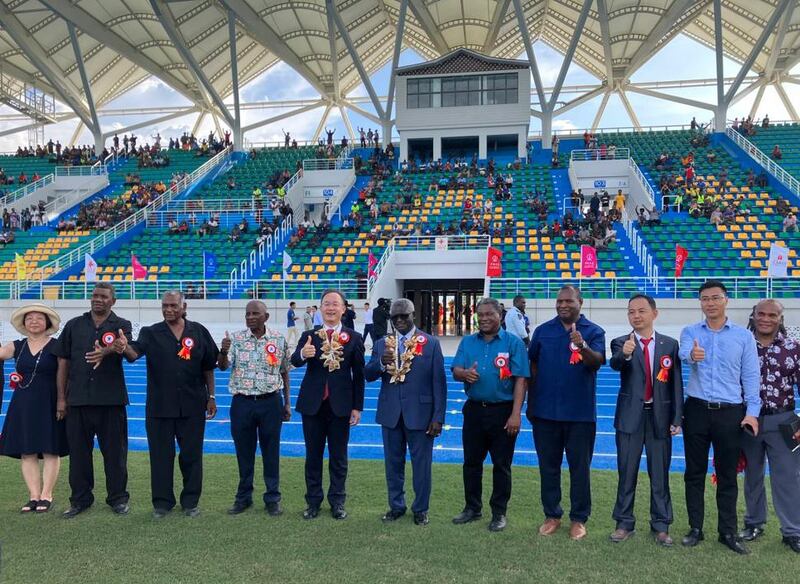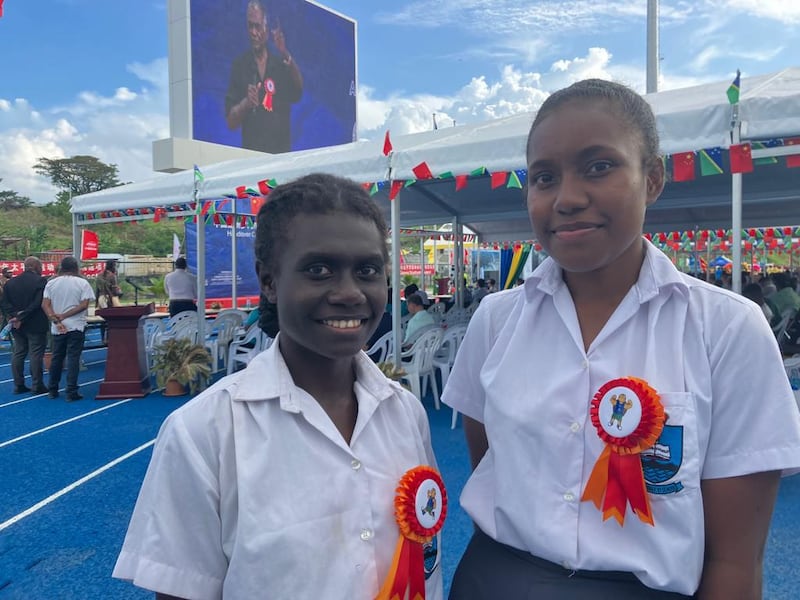Construction work for the upcoming 2023 Pacific Games prevented economic collapse for the Solomon Islands during the COVID-19 pandemic, the Pacific country’s prime minister has asserted at a ceremony to mark China’s handover of the recently completed main stadium.
The 24-nation regional games, which will take place in the Solomon Islands capital Honiara in November, will bring in several thousand athletes and visitors and also are an opportunity for China’s government to highlight its assistance to the Pacific island country after it changed its diplomatic recognition to Beijing from Taiwan in 2019.
“Without the financial and economic boost brought in by the 2023 Pacific Games projects, our economy would have collapsed,” Solomon Islands Prime Minister Manasseh Sogavare said Friday at the stadium ceremony.
An aquatic center, also built by China, will be officially handed over to the games hosting authority later this week.
China has contributed half of the games’ approximate 1.85 billion Solomon Island dollars (U.S.$220 million) cost and the Solomon Islands government nearly one third. Australia, Japan and Indonesia also have made significant contributions.
“The investment brought in by the Pacific Games injected a much-needed boost into our economy and also facilitated progress on other major infrastructure projects,” Sogavare said. He cited a new international airport terminal and Japan’s repairing of the potholed highway between the airport and capital.
The pandemic froze global travel in 2020-21 and also disrupted commerce and trade. Pacific island countries, which were particularly vulnerable to the virus because of existing health burdens, imposed very stringent border closures and suffered high economic costs.

Under Sogavare, the Solomon Islands has sought to benefit from the rivalry in the Pacific between China and the United States by securing more development assistance. The country, an archipelago about 2,100 kilometers (1,300 miles) northeast of Brisbane, Australia, struggles with crumbling roads, limited telecommunications and lack of basic healthcare.
China, over several decades, has become a substantial source of trade, infrastructure and aid for developing Pacific island countries as it seeks to isolate Taiwan diplomatically and build its own set of global institutions.
The Solomon Islands, home to some 700,000 people, has been Beijing’s highest profile success in building influence among Pacific island countries in recent years. Last year it signed a security pact with China, alarming the U.S. and its allies such as Australia, who fear it could lead to a Chinese military presence in the region.
China’s ambassador to the Solomon Islands, Li Ming, said facilities and infrastructure for the Pacific Games were aligned with the Belt and Road Initiative – China’s sprawling plan to dot the globe with ports, roads, railways and other infrastructure that furthers its trade and economic interests.
“This world-class stadium symbolizes the friendship between China and the Solomon Islands and it also fills the people of Solomon Islands with pride,” Li said.
“The stadium is the best gift to the government and people of Solomon Islands from the People’s Republic of China, at the right time.”

China Civil Engineering Construction Corp., which helped build the 10,000-seat main stadium, will help with its maintenance for two years following the handover, according to Sogavare.
Solomon Islands’ opposition leader Matthew Wale has criticized spending on the games as wasteful, particularly when the country struggles to provide basic healthcare.
Other critics have said the Games will reinforce lopsided development in the Solomon Islands that mainly benefits the capital and questioned whether the government can afford to maintain the facilities.
Among the enthusiastic crowd at the handover ceremony was David Tutukiri, a high school principal, who said young people will benefit from having proper sports facilities.
“These facilities are greatly appreciated by ordinary citizens. We are fortunate to have them,” he said.
Unity Galekausua, a student at King George VI High School in Honiara, said it was a thrill to attend the ceremony.
“This stadium signifies hope for the future,” she said. “With better sports facilities, young people aiming to excel in sports can receive proper training.”
BenarNews is an RFA-affiliated online news organization.
